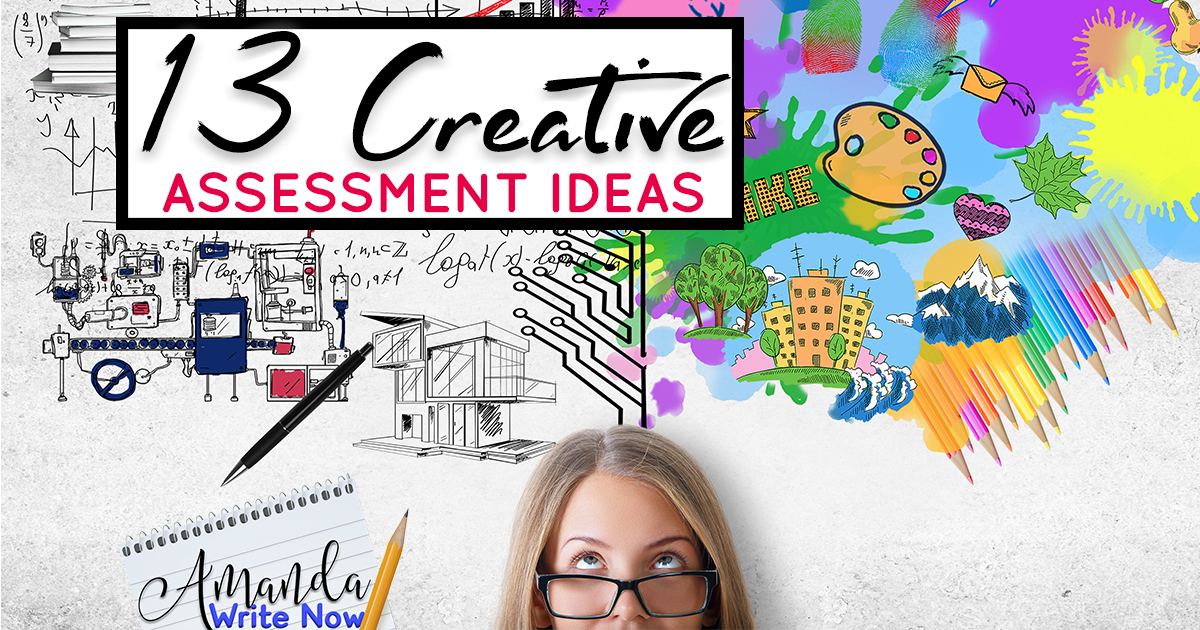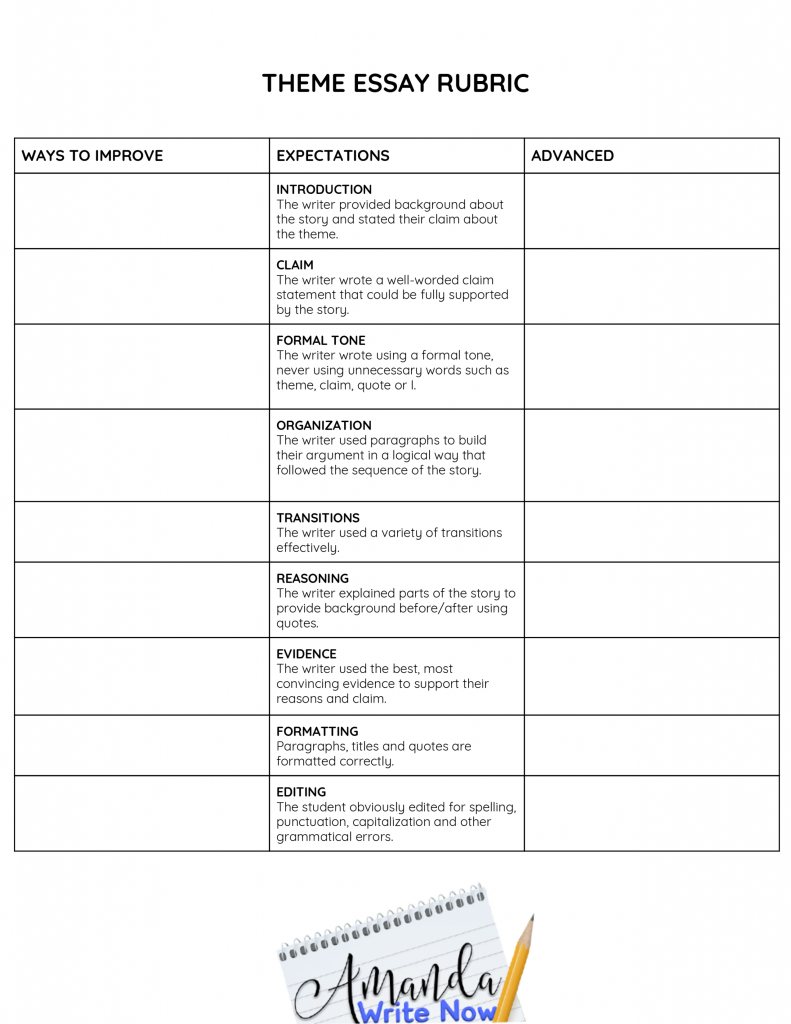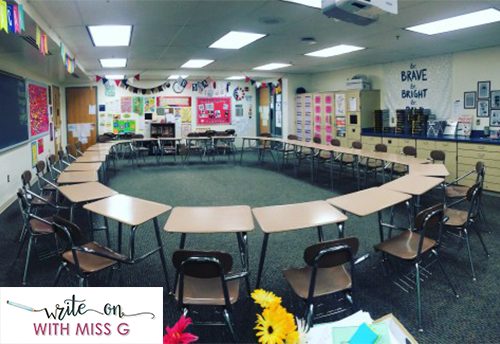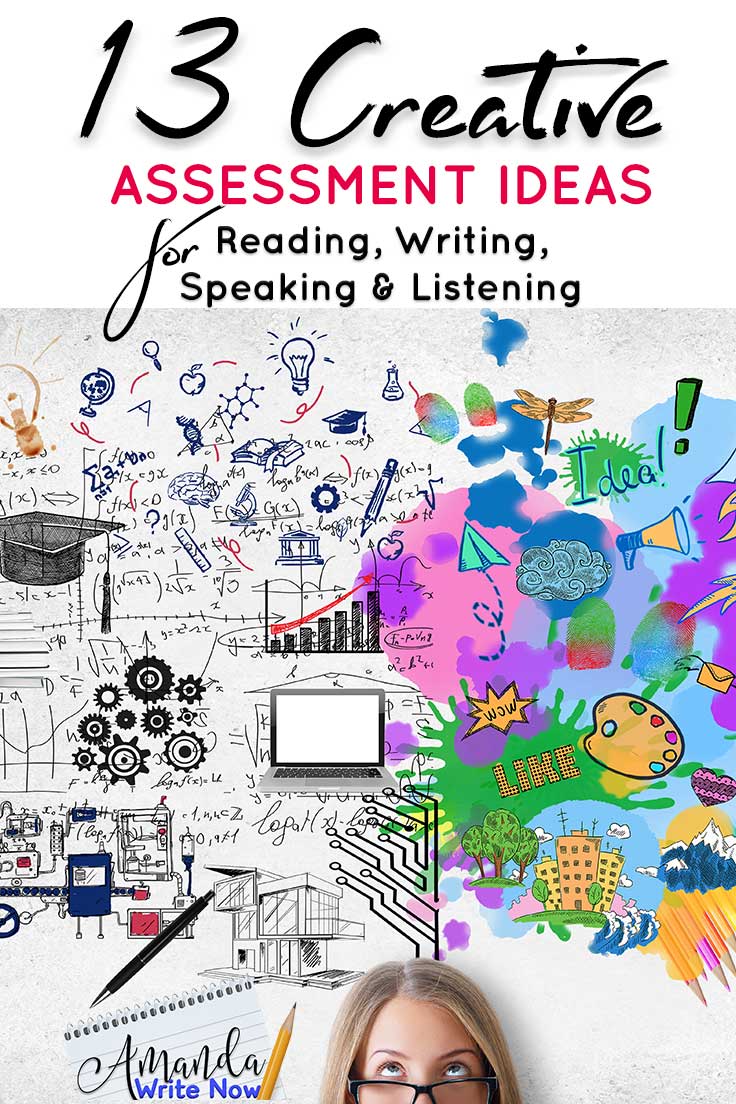
English teachers often default to essays, quizzes and tests as assessments. Figuring out creative ways to assess beyond this can be challenging. So, I’ve teamed up with some of my favorite blogging friends (see who below) to come up with creative ways to assess students’ skills as readers, writers, speakers and listeners!
This article would not be possible without the innovative ideas of these amazing teacher bloggers. Be sure to click over to their websites because they have so many brilliant, time saving ideas to offer teachers…
Reading Assessment
Google Keep
Assessing annotation while reading is tricky. The logistics are frustrating – do we have to keep collecting their books to check? What about if kids can’t write in their books? What should kids be looking for? In a blog post, Amanda from Mud and Ink Teaching shares how she has started using Google Keep to track and assess student annotations while reading whole class novels. With just a small digital adjustment and the help of Google Classroom, Google Keep annotations could be an assessment lifesaver for your classroom.

Conversations
One important goal all ELA teachers should share is to be able to assess a student’s comprehension of a text without making him or her hate reading. Melissa from Reading and Writing Haven wrote a blog post detailing some of her favorite strategies that make assessment enjoyable while also building teacher-student relationships and improving reading culture in the classroom. The biggest secret is that of allowing valuable conversations and abstract thinking to replace tedious and often punitive multiple choice tests and quizzes.
Self-Assessment
Students in middle and high school should have opportunities to self-assess their reading independence. One way to support them in this important real-world skill is to have students track how long they can read before getting distracted or bored. It’s important to normalize the experience of getting bored or distractied while reading and explain that many people find reading challenging for numerous reasons. After students feel comfortable admitting they may dislike reading or find it challenging to focus their attention on it, provide students opportunities to test their stamina. Set a timer for 30 minutes and have students write down how long they read, within the 30 minute time frame, before getting distracted or bored. Have students write their time down and set goals to reach higher stamina levels.
Innovative Projects
As schools are trending toward a more standard-based curriculum, standard-aligned assessments are more important than ever before. Though this may seem like a challenge, it actually creates more autonomy for teachers and students alike. One way Ashely Bible from Building Book love likes to disguise assessing student’s inferencing and evidence-providing ability is by assigning a innovative projects like a tiny house character design project or this free culinary symbolism project. Students will infer and use evidence just as much as a written assessment, but will have a lot more fun doing so!
Writing Assessment
Pre-Assessment Rubrics
Writing pre-assessments are valuable because they allow teachers to see common themes across the class. Is everyone struggling with transitions? Maybe, overall, students aren’t sure how to write an effective hook or thesis statement. Pre-assessments can reveal those needs. Also, they can begin our goal-setting conversations. It’s important to differentiate writing unit to meet students’ needs, and goal setting with individual students can be a way to we frame those conversations, initiated by a pre-assessment. It’s rewarding for a student to reflect on their growth from the beginning of a writing unit to the end. Here are the goal-setting forms and pre-assessment rubrics Reading and Writing Haven uses.
Conferencing
Conferencing is the best way to assess and provide feedback while in the middle of a unit. But how do you go about conferencing with 125+students?!?! It can be incredibly helpful to teach students how to conference with each other to take the work load off of you and put some of the assessment work on their shoulders. This video can help…
Another question teachers have about conferring is: how do I decide what to help each student with? The best way to assess a student during a conference is by asking, “how can I help you?”, and if a student can’t answer that question, the next step would be to read a small portion of their writing to get a sense of one major skill they could most use support with. Keep it simple! This article from WeAreTeachers discusses using notecards to assess students’ skills and plan conferences.
The Single-Point Rubric
The singe-point rubric is the wave of the future! If you have no idea what a single-point rubric is, here is a simple definition for you:
A single-point rubric lists the skills you want students to master with room for commenting if students have not yet mastered the skills, or exceeded mastery.

So, you are probably wondering how exactly to assign points using a single point rubric, right? It depends on your needs. When a student exhibits the skills in the middle column it is considered mastery or standard met.
This could mean an A in your school/district but it could also mean a B too. It all really depends on your preference. You can make each skill in the middle column worth 1 point or 10. You could make the “ways to improve” column worth a little less and the “advanced” column worth a little more. Again, it is really up to you! Check out this awesome resource with many editable assessment tools…
Fast and Focused Feedback
As for assessing grammar knowledge, Ashley Bible from Building Book Love has implemented a system that tests students on their individual grammar issues. Once she marks a grammar issue in their writing, they watch a mini lesson and take a quiz to assess their new understanding. You can read all about this system here: Fast and Focused Feedback. Check out this amazing video about how to make your feedback fast and focused…
Listening & Speaking Assessment
Goal Setting Cards
Use goal setting cards with public speaking students. To assess public speaking, ask students to choose where they would like to improve. Assess students on their growth toward their goal. Find goal sheets and other public speaking activities on the Language Arts Classroom blog here.
Student-Led Discussions
If you’re tired of multiple choice and essay questions and searching for a more meaningful way to assess students’ understanding of your next novel, try a Socratic Seminar. Essentially, it is a student-led discussion over a text or big idea. Instead of you facilitating the discussion by asking questions, students take charge of their own learning in this activity by creating and asking the questions. A Socratic Seminar is truly a student-centered and social approach to learning. For you, this means it is less prep work. It’s one of those lessons that teaches itself. You literally can sit back, relax, and watch the magic happen. If you’d like more information on facilitating your own seminar, check out this blog post. For ready-to-print resources, rubrics, instructions, and more, check out this bundle that works for any text.

Mock Trials
A mock trial is another effective, engaging way to assess literary analysis. In addition to this skill, students will also demonstrate close reading, citing strong and thorough textual evidence, analyzing evidence, persuasion and argument skills, debate, writing, and speaking/listening. It is more than a lesson; it is a learning experience that engages every single student. For more guidance on using a mock trial as an end-of-unit assessment, check out this blog post by Write On With Miss G. If you need some help structuring your mock trial or want to save yourself some time creating everything, then this mock trial bundle that works any text may help.
Podcasts
Assessing listening skills can be a bit tricky. But one way to integrate the listening standards into your classroom is through podcasts. Ashley Bible from Building Book Love has an engaging unit using the Serial Podcast Season 1 to build students’ ability to listen, discuss and respond to a very engaging podcast for grown ups and high schoolers alike. Ashley includes ways to assess students’ listening skills in this unit too!
Wrap Up
Assessments can be more than just quizzes, end of unit essays and tests! Hopefully this article has motivated you to try a new method of assessment that is engaging and maybe even excites you! Teachers getting excited about assessment and not dreading it, now that is something to strive for, don’t you think?
What creative assessment ideas do you use in your classroom? We’d love to hear from you in the comments!

0 Comments
Trackbacks/Pingbacks